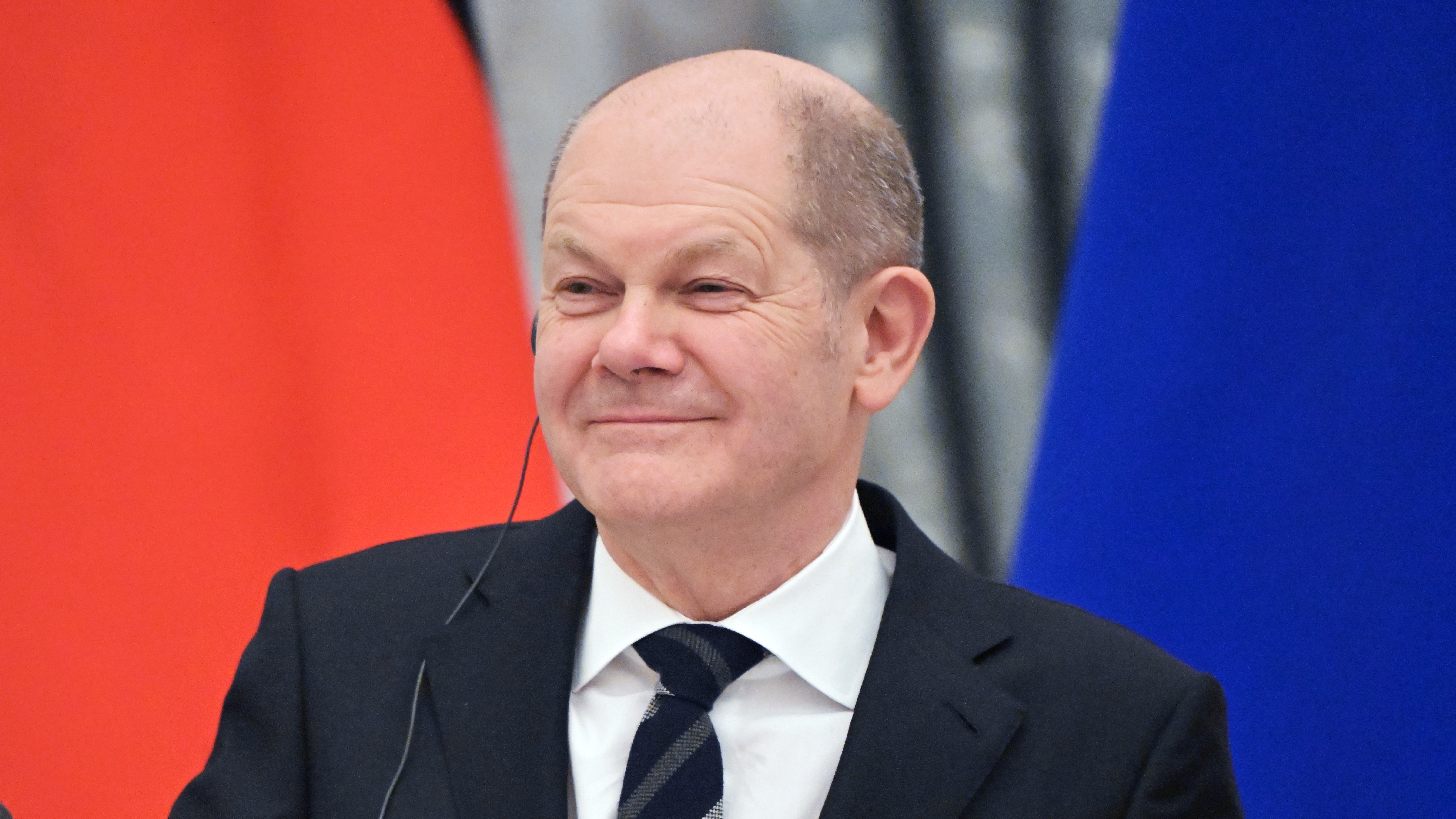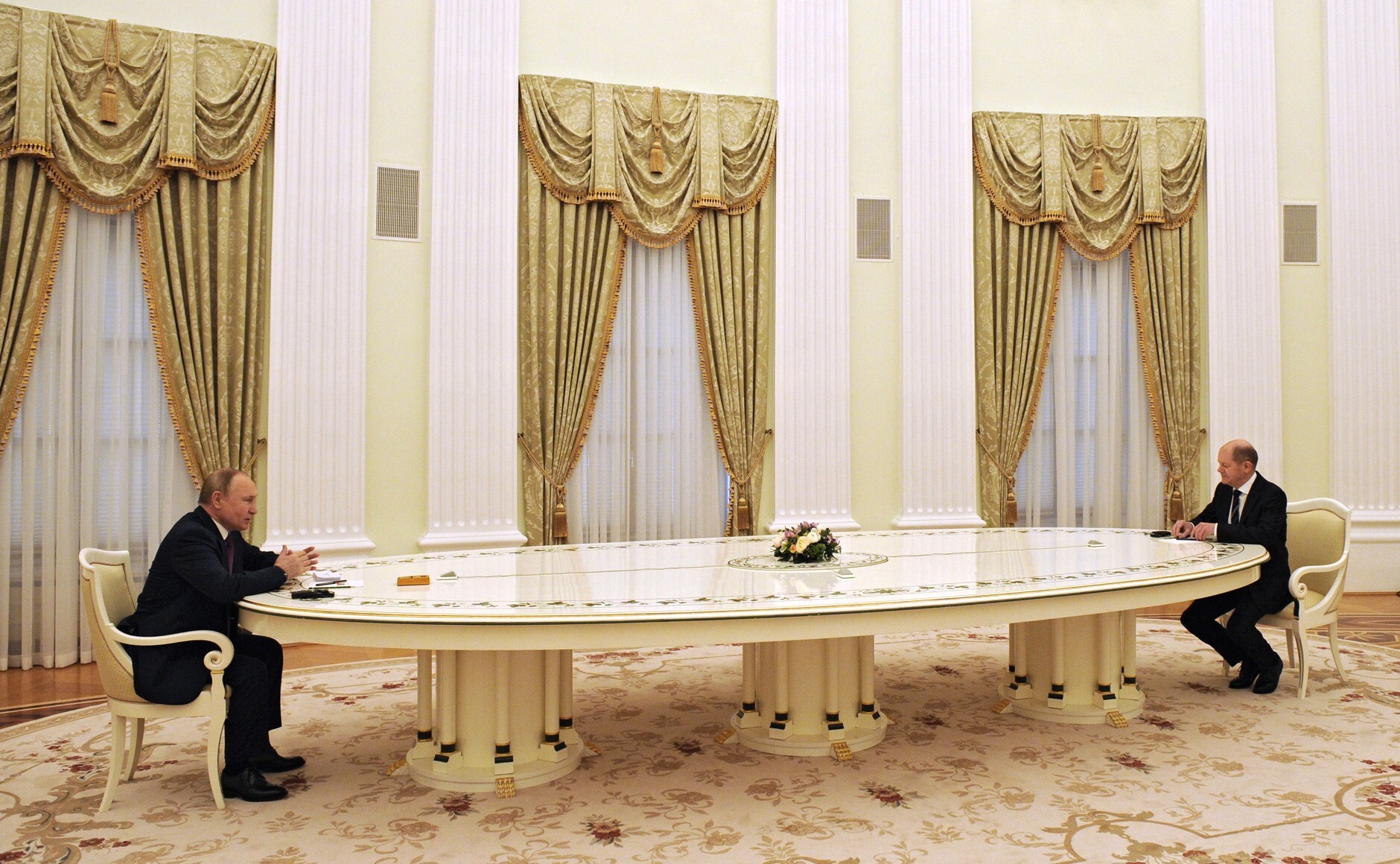Is Olaf Scholz’s ‘quiet’ diplomacy stemming Russia-Ukraine tensions?
As Nato leaders warn of impending invasion, the German chancellor has maintained his ‘poker face’

A free daily email with the biggest news stories of the day – and the best features from TheWeek.com
You are now subscribed
Your newsletter sign-up was successful
German Chancellor Olaf Scholz has for months been accused of weak leadership over the crisis in Ukraine, with critics claiming that Berlin’s concern over European energy supplies and historic guilt have trumped the defence of Kyiv’s sovereignty.
But after diplomatic overtures by Foreign Secretary Liz Truss and Emmanuel Macron failed to achieve a breakthrough with Vladimir Putin, Scholz has adopted what Reuters described as a more “assertive style” in his talks with the Russian president.
Where Macron boasted of having a “historic solution” to stem rising tensions in Eastern Europe, the German chancellor has maintained a stoic “poker face”, The Times’s Berlin correspondent Oliver Moody said.
The Week
Escape your echo chamber. Get the facts behind the news, plus analysis from multiple perspectives.

Sign up for The Week's Free Newsletters
From our morning news briefing to a weekly Good News Newsletter, get the best of The Week delivered directly to your inbox.
From our morning news briefing to a weekly Good News Newsletter, get the best of The Week delivered directly to your inbox.
And doing so has seen him emerge as a key “broker” between East and West, “keeping Putin onside” where his Nato allies have failed.
‘Quiet diplomacy’
Political commentators had long wondered how the “mild-mannered Scholz” would perform when he was forced to step into Putin’s “lion’s den”, Reuters reported.
The Russian president has been “known to publicly taunt or seek to outplay” his visitors “in a test of their mettle”, most notably bringing his black labrador into a meeting with Scholz’s predecessor Angela Merkel in 2007 despite her well-known fear of dogs.
But during talks in Moscow yesterday, Scholz “seemed to relish” standing up to his counterpart.
A free daily email with the biggest news stories of the day – and the best features from TheWeek.com
The chancellor “was unexpectedly combative” while “maintaining his trademark quiet, measured tone”, the news agency reported. At one point he even “poked fun at Putin’s fears of Nato's eastern enlargement”, suggesting that it would not be on the agenda of the military alliance during the Russian president’s tenure.

“I don’t quite know how long the president plans to stay in office,” he said. “I have a feeling this could be a long time, but not forever.”
If there is “one respect” in which Scholz “differs” from Merkel, it is his ability to deploy a strong “poker face”, said The Times’s Moody. He watched Putin “accuse Ukraine of carrying out ‘a genocide’ against its Russian-speaking minority and rail against Nato’s military intervention in Yugoslavia”, but throughout “his expression barely shifted”.
It is “hard to think of a less messianic world leader” than the German chancellor, Moody said. But in the current climate, his ability to “play with his cards close to his chest”, mainly “confining himself to measured generalities”, has served him and Germany well.
Amid all the bluster, it would appear Scholz’s “quiet” diplomacy is coming to the fore.
‘Down the negotiations track’
After four hours of talks with Putin, Scholz told a joint press conference that “the most important thing is that we manage relations between countries through good discussions with each other”.
Putin responded by describing Germany as “one of Russia’s most important partners”, stating that Russia is “ready to work further together. We are ready to go down the negotiations track”.
Scholz arrived in Moscow having met with Ukrainian President Volodymyr Zelensky, with sources telling the Kyiv Independent that he joined efforts by Western leaders to have the Ukrainian government “comply with the Russian spin of the Minsk Agreements”.
The chancellor “tried to talk Zelensky into granting Russian-occupied regions autonomy”, the news site reported, “which is one of the key demands made by the Kremlin”. Specifically, Scholz suggested that Zelensky should “present a plan to introduce ‘special status’ for occupied Donbas” in order to stem the build-up of Russian troops.
Russia yesterday announced that it was withdrawing troops from the Russian border, a claim that Nato and the government in Kyiv have said is yet to materialise. But Scholz has put himself “in a position to seize precisely this kind of moment”, Moody said.
As Germany’s Nato allies rushed to deliver weapons to Ukraine and give “apocalyptic warnings of an imminent attack”, Scholz maintained a “sphinx-like” approach of “strategic ambiguity”, always “promising little and ruling out even less”.
At the time, his refusal to join his Nato allies in their urgency “exasperated Ukraine and irked some of Germany’s European neighbours”, Moody said. But his “fence-sitting” has maximised “his room for manoeuvre as an honest broker between Ukraine, Nato and Russia”.
-
 The environmental cost of GLP-1s
The environmental cost of GLP-1sThe explainer Producing the drugs is a dirty process
-
 Nuuk becomes ground zero for Greenland’s diplomatic straits
Nuuk becomes ground zero for Greenland’s diplomatic straitsIN THE SPOTLIGHT A flurry of new consular activity in Nuuk shows how important Greenland has become to Europeans’ anxiety about American imperialism
-
 ‘This is something that happens all too often’
‘This is something that happens all too often’Instant Opinion Opinion, comment and editorials of the day
-
 What happens now that the US-Russia nuclear treaty is expiring?
What happens now that the US-Russia nuclear treaty is expiring?TODAY’S BIG QUESTION Weapons experts worry that the end of the New START treaty marks the beginning of a 21st-century atomic arms race
-
 Epstein files topple law CEO, roil UK government
Epstein files topple law CEO, roil UK governmentSpeed Read Peter Mandelson, Britain’s former ambassador to the US, is caught up in the scandal
-
 Iran and US prepare to meet after skirmishes
Iran and US prepare to meet after skirmishesSpeed Read The incident comes amid heightened tensions in the Middle East
-
 Israel retrieves final hostage’s body from Gaza
Israel retrieves final hostage’s body from GazaSpeed Read The 24-year-old police officer was killed during the initial Hamas attack
-
 China’s Xi targets top general in growing purge
China’s Xi targets top general in growing purgeSpeed Read Zhang Youxia is being investigated over ‘grave violations’ of the law
-
 Ukraine, US and Russia: do rare trilateral talks mean peace is possible?
Ukraine, US and Russia: do rare trilateral talks mean peace is possible?Rush to meet signals potential agreement but scepticism of Russian motives remain
-
 Panama and Canada are negotiating over a crucial copper mine
Panama and Canada are negotiating over a crucial copper mineIn the Spotlight Panama is set to make a final decision on the mine this summer
-
 The rise of the spymaster: a ‘tectonic shift’ in Ukraine’s politics
The rise of the spymaster: a ‘tectonic shift’ in Ukraine’s politicsIn the Spotlight President Zelenskyy’s new chief of staff, former head of military intelligence Kyrylo Budanov, is widely viewed as a potential successor